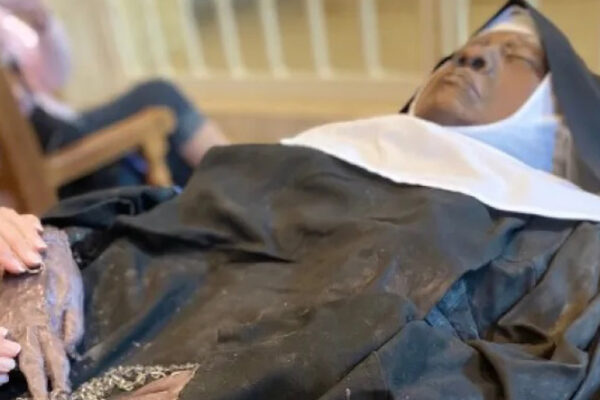
Miracle in America: Medical Report Confirms Another Nun’s Body Incorrupt
Following a months-long investigation, the bishop of Kansas City-St. Joseph, Missouri, has concluded that the body of a Midwestern nun buried in 2019 appears to be “incorrupt.” “Within the limits of what has been observed during this time, the body of Sister Wilhelmina Lancaster does not appear to have experienced the decomposition that would have normally been expected under such previous burial conditions,” Bishop James V. Johnston, Jr., said in a statement August 22. The community that Sister Wilhemina founded, the Benedictines of Mary, Queen of Apostles, said in a statement provided to Aleteia: “We are very grateful for Bishop Johnston’s statement regarding our foundress, Sister Wilhelmina, and are thankful that His Excellency has shown such solicitude in providing a scientific investigation for the claim of the miracle of her incorruptibility. Many pilgrims continue to visit her, and we receive ongoing reports of favors and miracles, which are being attentively gathered. We rejoice that Sister Wilhelmina continues to be a bright light of faith for all Christians, confirming us all in the truth of the Resurrection and the life of the world to come.” Bishop Johnston pointed out that the Catholic Church does not have an official protocol for determining if a deceased person’s body is incorrupt, and incorruptibility is not considered to be an indication of sainthood. He said that there is no current plan to initiate a cause for sainthood for Sister Wilhelmina. She died in 2019 Sister Wilhelmina died on May 29, 2019, at the age of 95. She was buried within days in a grave on the property of the Benedictines of Mary, Queen of Apostles in Gower, Missouri. She was not embalmed, and her body was placed in a simple pine box, without a vault protecting her body from the elements. Following the exhumation of her body on April 28, 2023, for the purpose of moving it into the Abbey church for interment, it was discovered that her body did not exhibit signs of decomposition that would normally have occurred after nearly four years of burial under the conditions that existed in her grave. “On May 24, 2023, as the Bishop of the Diocese of Kansas City-St. Joseph, I commissioned a team of local medical experts to conduct an examination and evaluation of Sister Wilhelmina’s body,” Johnston stated. “The team was led by a Doctor of Pathology, who was assisted by two other medical doctors and a former Missouri county coroner. In addition to examining and evaluating the mortal remains of the deceased, the team inspected the casket, and interviews were conducted with eyewitnesses to events immediately preceding the burial in 2019 and the exhumation in April 2023.” In the final report, the investigative team noted that the condition of Sister Wilhelmina’s body during the examination was notable for a lack of any detected features of decomposition, the bishop said. The lining of her casket had completely deteriorated, but her habit and clothing showed no features of breakdown. “The report also noted that the related history of Sister Wilhelmina’s death and interment does not describe conditions that would be expected to protect against decomposition,” he said He said that the investigative team was only able to conduct a limited examination but still concluded that “the condition of her body is highly atypical for the interval of nearly four years since her death, especially given the environmental conditions and the findings in associated objects.” Along with the evaluation by medical experts, additional tests were soon conducted on the soil in which the burial took place. After analysis, no unusual elements were found which would have impacted the condition of Sister Wilhelmina’s body when it was exhumed. Founded community Sister Wilhelmina in 1995 founded the Benedictines of Mary, Queen of Apostles, a contemplative community consecrated to prayer and sacrifice for priests through the Rule of St. Benedict. They celebrate the liturgy as it was before the Second Vatican Council-era reforms. The 50 or so nuns in the community today devote about five hours a day to the chanting of the Mass and Divine Office and private prayer. The sisters’ remaining time is spent doing manual labor, such as sewing vestments for priests, gardening, cooking, and farm work. Read more…